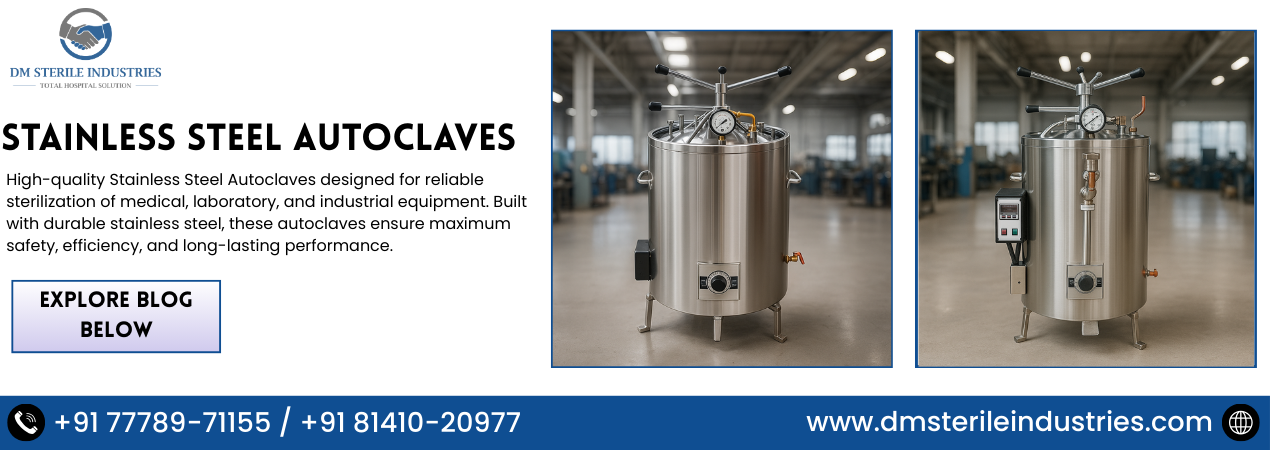Stainless Steel Autoclaves
Introduction to Stainless Steel Autoclaves
A stainless steel autoclave is an essential piece of equipment used for high-pressure steam sterilization. Built with high-grade stainless steel, these devices are crucial in a variety of settings, including hospitals, laboratories, dental clinics, and pharmaceutical facilities. The use of stainless steel ensures exceptional durability, corrosion resistance, and a hygienic surface, making it the ideal material for a machine that must withstand high temperatures and moisture. Autoclaves effectively kill bacteria, viruses, fungi, and spores on instruments, glassware, and other materials, playing a critical role in infection control and maintaining sterile environments.
Working Principle and Process Flow for Stainless Steel Autoclaves
Stainless steel autoclaves operate on the principle of using saturated steam under high pressure and temperature to achieve sterilization. The process begins with the chamber being sealed, followed by a vacuum cycle to remove air. Water is then heated to generate steam, which is pressurized to reach temperatures typically between 121°C and 134°C. This high-temperature steam penetrates the items in the chamber, denaturing proteins and killing all microorganisms. Once the sterilization phase is complete, the chamber is depressurized, and the items are dried. The robust stainless steel construction ensures the integrity of the chamber under these extreme conditions, providing a safe and effective sterilization process every time.
Types of Stainless Steel Autoclaves
- Laboratory Autoclaves: Used for sterilizing culture media, lab tools, and waste.
- Horizontal Autoclaves: Large-capacity autoclaves for hospitals and research centers, designed for easy loading of bulky items.
- Vertical Autoclaves: Space-saving models, often used in smaller clinics and labs, loaded from the top.
- Dental Autoclaves: Specifically designed to sterilize dental instruments and equipment.
- Portable Autoclaves: Compact and easy-to-move units for on-site or small-scale sterilization.
Key Features and Specifications for Stainless Steel Autoclaves
- High-Grade Stainless Steel Construction: Chamber and body made from SS 304 or SS 316 for superior durability and corrosion resistance.
- Automatic & Semi-Automatic Operation: Modern units with digital controls for pre-programmed or custom sterilization cycles.
- Advanced Safety Features: Equipped with pressure locks, over-temperature protection, and safety valves.
- Energy Efficiency: Designed for rapid heating and effective sterilization with minimal energy consumption.
- User-Friendly Interface: Easy-to-read digital displays for monitoring temperature, pressure, and cycle status.
Applications of Stainless Steel Autoclaves
- In hospitals and medical clinics, stainless steel autoclaves are crucial for sterilizing surgical instruments, drapes, and other medical devices to prevent hospital-acquired infections and ensure patient safety.
- Microbiology and research laboratories rely on autoclaves to sterilize lab glassware, culture media, and biological waste, preventing contamination and ensuring the accuracy of experiments.
- Dental clinics use compact stainless steel autoclaves to sterilize handpieces, burs, and other dental tools, maintaining a sterile environment for all procedures.
- The pharmaceutical and biotechnology industries use autoclaves to sterilize media, containers, and production equipment, adhering to strict regulatory standards for product purity and quality.
Benefits of Stainless Steel Autoclaves
- Stainless steel construction ensures superior durability and resistance to corrosion, allowing the autoclave to withstand the high-pressure and high-moisture environment for many years.
- The smooth, non-porous surface of stainless steel is easy to clean and maintain, ensuring a high level of hygiene and preventing the buildup of microorganisms.
- Autoclaves provide a reliable and efficient method of sterilization, consistently delivering high temperatures and pressures to guarantee the complete elimination of all microbial life, including spores.
- Modern stainless steel autoclaves are equipped with advanced digital controls and safety features, ensuring precise cycle management and safe operation for both the equipment and the user.
Manufacturers & Suppliers in India
India has a robust market for stainless steel autoclaves, with numerous manufacturers and suppliers providing high-quality sterilization equipment. Companies across major industrial hubs cater to the specific needs of healthcare, research, and pharmaceutical sectors with reliable and efficient products. These firms offer a wide range of models, from compact laboratory units to large-scale hospital-grade autoclaves, meeting both domestic and international standards for safety and performance.
Maintenance and Safety Tips
- Regularly check and clean the chamber and door gaskets to ensure a perfect seal during sterilization cycles.
- Use only distilled or demineralized water to prevent scale buildup inside the chamber, which can affect performance and shorten the machine's lifespan.
- Always inspect the safety valve and pressure gauges to ensure they are functioning correctly and providing accurate readings.
- Follow the manufacturer's guidelines for proper loading of the autoclave to ensure steam can effectively circulate and sterilize all items.
- Ensure the area where the autoclave is installed is well-ventilated to allow for safe steam release after each cycle.
FAQs – Stainless Steel Autoclaves
Contact Details
Talk to our specialists today for tailored solutions and fast assistance.

